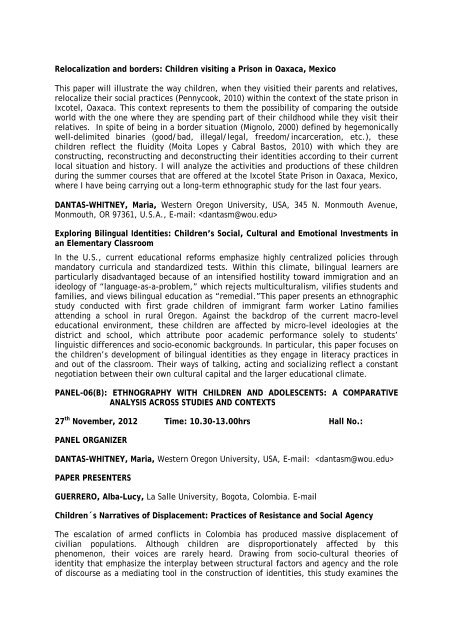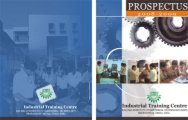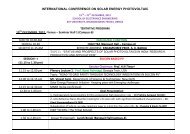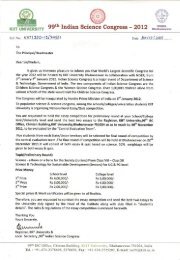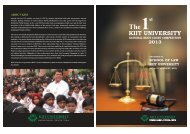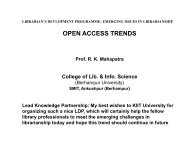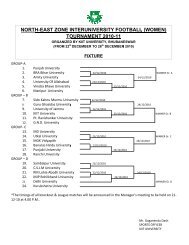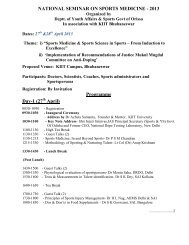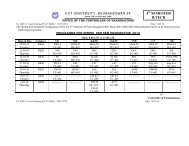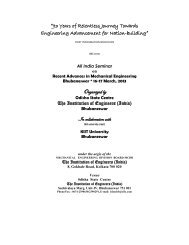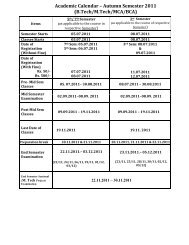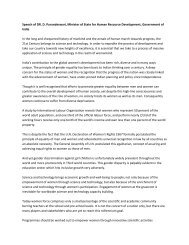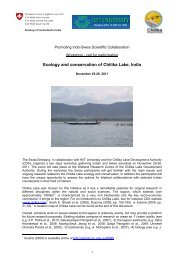PANEL ORGAN - KIIT University
PANEL ORGAN - KIIT University
PANEL ORGAN - KIIT University
Create successful ePaper yourself
Turn your PDF publications into a flip-book with our unique Google optimized e-Paper software.
Relocalization and borders: Children visiting a Prison in Oaxaca, Mexico<br />
This paper will illustrate the way children, when they visitied their parents and relatives,<br />
relocalize their social practices (Pennycook, 2010) within the context of the state prison in<br />
Ixcotel, Oaxaca. This context represents to them the possibility of comparing the outside<br />
world with the one where they are spending part of their childhood while they visit their<br />
relatives. In spite of being in a border situation (Mignolo, 2000) defined by hegemonically<br />
well-delimited binaries (good/bad, illegal/legal, freedom/incarceration, etc.), these<br />
children reflect the fluidity (Moita Lopes y Cabral Bastos, 2010) with which they are<br />
constructing, reconstructing and deconstructing their identities according to their current<br />
local situation and history. I will analyze the activities and productions of these children<br />
during the summer courses that are offered at the Ixcotel State Prison in Oaxaca, Mexico,<br />
where I have being carrying out a long-term ethnographic study for the last four years.<br />
DANTAS-WHITNEY, Maria, Western Oregon <strong>University</strong>, USA, 345 N. Monmouth Avenue,<br />
Monmouth, OR 97361, U.S.A., E-mail: <br />
Exploring Bilingual Identities: Children’s Social, Cultural and Emotional Investments in<br />
an Elementary Classroom<br />
In the U.S., current educational reforms emphasize highly centralized policies through<br />
mandatory curricula and standardized tests. Within this climate, bilingual learners are<br />
particularly disadvantaged because of an intensified hostility toward immigration and an<br />
ideology of “language-as-a-problem,” which rejects multiculturalism, vilifies students and<br />
families, and views bilingual education as “remedial.”This paper presents an ethnographic<br />
study conducted with first grade children of immigrant farm worker Latino families<br />
attending a school in rural Oregon. Against the backdrop of the current macro-level<br />
educational environment, these children are affected by micro-level ideologies at the<br />
district and school, which attribute poor academic performance solely to students’<br />
linguistic differences and socio-economic backgrounds. In particular, this paper focuses on<br />
the children’s development of bilingual identities as they engage in literacy practices in<br />
and out of the classroom. Their ways of talking, acting and socializing reflect a constant<br />
negotiation between their own cultural capital and the larger educational climate.<br />
<strong>PANEL</strong>-06(B): ETHNOGRAPHY WITH CHILDREN AND ADOLESCENTS: A COMPARATIVE<br />
ANALYSIS ACROSS STUDIES AND CONTEXTS<br />
27 th November, 2012 Time: 10.30-13.00hrs Hall No.:<br />
<strong>PANEL</strong> <strong>ORGAN</strong>IZER<br />
DANTAS-WHITNEY, Maria, Western Oregon <strong>University</strong>, USA, E-mail: <br />
PAPER PRESENTERS<br />
GUERRERO, Alba-Lucy, La Salle <strong>University</strong>, Bogota, Colombia. E-mail<br />
Children´s Narratives of Displacement: Practices of Resistance and Social Agency<br />
The escalation of armed conflicts in Colombia has produced massive displacement of<br />
civilian populations. Although children are disproportionately affected by this<br />
phenomenon, their voices are rarely heard. Drawing from socio-cultural theories of<br />
identity that emphasize the interplay between structural factors and agency and the role<br />
of discourse as a mediating tool in the construction of identities, this study examines the


